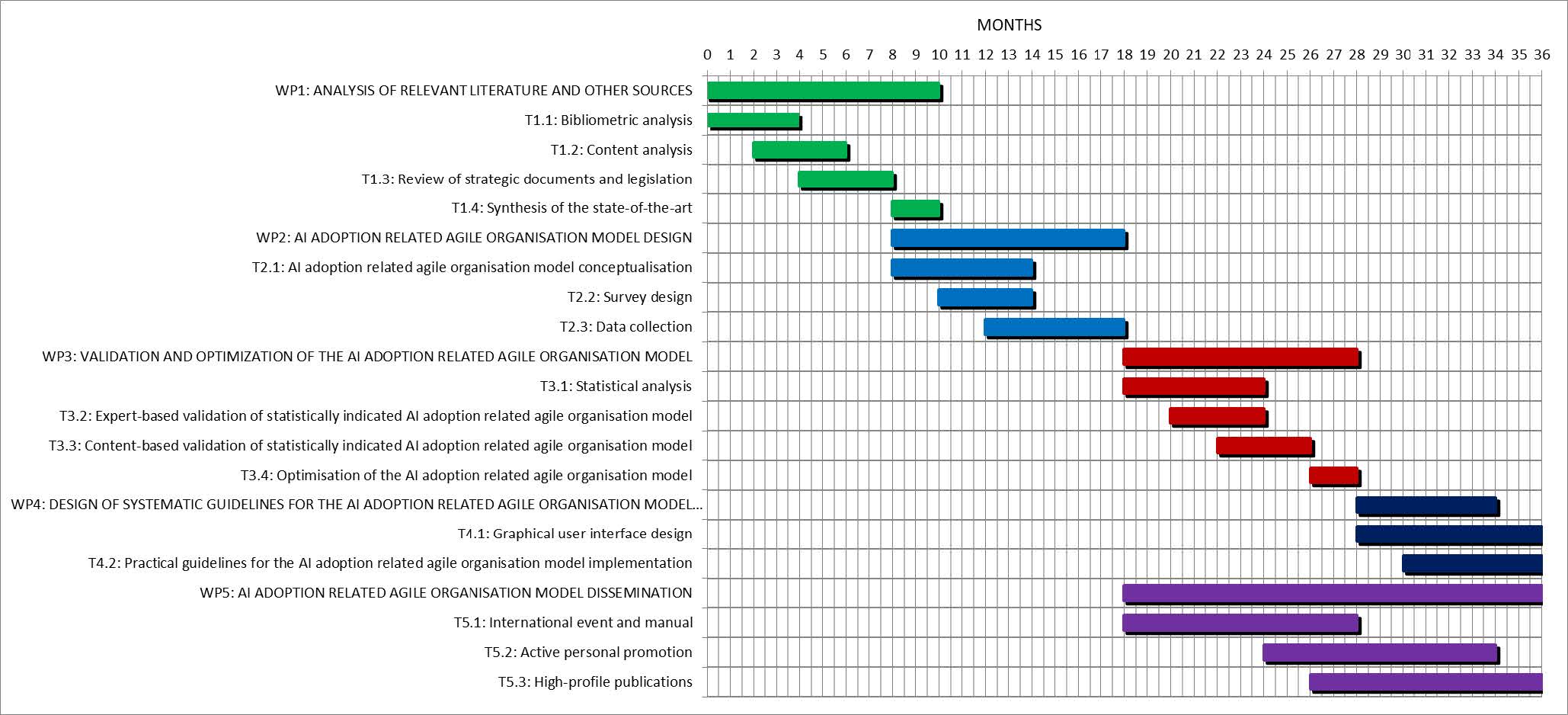Title: Designing an agile organisation model for efficient artificial intelligence adoption in public administration institutions (J5-60097)
Head of the research group: doc. dr. Dejan Ravšelj
Since in the last few decades the environment in which public administration operates has been becoming ever more volatile, uncertain, complex and ambiguous (abbreviated as VUCA), there is a need for public administration institutions to become agile and thus more resilient. The traditional public manager often believes and hopes that changes are merely a fix they can apply to specific issues, rather than a fundamentally different way of exercising management itself. One of the important changes being introduced in the last decade into public administration is artificial intelligence. To introduce artificial intelligence (AI) as smoothly as possible, policymakers and public managers must recognise and understand the range of possibilities for using this technology and, most importantly, the way that artificial intelligence interrelates with the organisation’s key elements. In this context, the research project’s main idea is to show the need for new management approaches to respond to state-of-the-art technologies, such as AI – as quickly, effectively, efficiently, transparently, holistically and sustainably as possible – and to thereby ensure good governance in public administration institutions in the long run. Public managers should engage in an agile-adaptive approach to management that requires decisiveness and relatively quick actions – to plan and organise flexibly, to lead (hire, motivate, communicate) effectively and efficiently, to collect relevant information, to act decisively, to control holistically, and to keep adapting and innovating – all in close cooperation with their team members and other public administration stakeholders.
The project’s starting point is the assumption that ‘agile’ as a management approach supports and enables public administration institutions to harness the full potential of AI, leading to improved effectiveness, efficiency, decision-making, and public service delivery and thus to effectively and efficiently implement the state-of-the-art governance principles, all tailored to public administration stakeholders’ needs and expectations. Accordingly, the project’s main goal is to perform a comprehensive literature review and, on that basis, to design a holistic ‘agile organisation model for efficient artificial intelligence adoption’, which will be further empirically verified in the public administration context. The project aims to improve the operations of public administration institutions in contemporary society. More specifically, first, to enable public administration institutions to detect the level of their ‘agile maturity’ for efficient artificial intelligence adoption, second, to gain insight into the practices public managers could implement to reach the highest possible ‘agile’ maturity level of their public administration institution and, third, to set out the implications for policymakers, all with regard to public administration institutions operating in extreme VUCA circumstances in the near and distant future. The research within the project will be facilitated by several quantitative and qualitative literature review techniques (e.g., bibliometric analysis, content analysis), data collection approaches (e.g., questionnaires, in-depth interviews) and data analysis methods (e.g., narrative analysis, multivariate analysis). The innovative, agile organisation model for efficient artificial intelligence adoption will stem from primary agile management challenges such as internal elements, stakeholder engagement, and external influences. More specifically, the agile organisation model will consider the main organisational elements, agile values, principles of good governance and principles of artificial intelligence while considering the external environment (characterised as a VUCA world). This will allow public institutions to produce and deliver public services more effectively and efficiently, hence supporting and improving the functioning of all subjects in society.
Duration (from/to):
1.1.2025 – 31.1.2028
Contracting Authority:
Slovenian Research and Innovation Agency
Financing:
The project is being financed with 1246 yearly hours of A price category; for 3 years.

Project phases and their realization
The purpose of this project is to empower PA institutions with an agile organisation model for AI adoption that enhances service delivery, decision-making, and operational efficiency. By doing so, the project aims to position PA at the forefront of technological innovation, ensuring that it remains responsive, resilient, efficient, and effective in the digital age.
The main goal of the project will be operationalised through five complementary objectives:
1. to establish a conceptual (theoretical) framework for developing AI adoption related agile organisation model (AI-AOM), tailored to numerous public administration stakeholders’ needs and encompassing relevant dimensions, such as organisational elements, agile values, and good governance and AI principles, all with the purpose of effective and efficient AI adoption,
2. to conduct a customised survey involving PA institutions and a multi-stakeholder assessment of relevant AI-AOM elements, to test the AI-AOM in real-world scenarios, gathering data for refinement.
3. to quantitatively identify the ‘ideal’ readiness level of AI-AOM as indicated by sophisticated multivariate methods,
4. to provide an in-depth validation and optimisation of the statistically indicated AI-AOM employing mixed methods triangulation, and
5. to design an original software tool based on the AI-AOM that offers to different PA stakeholders an integrated, holistic set of referential values for the accelerated, ethical, transparent, and accountable adoption of AI-AOM in the praxis.
Projects phases:

